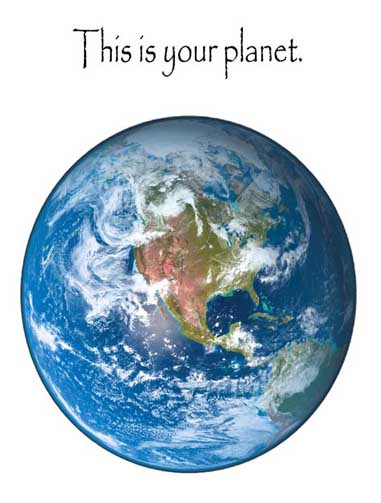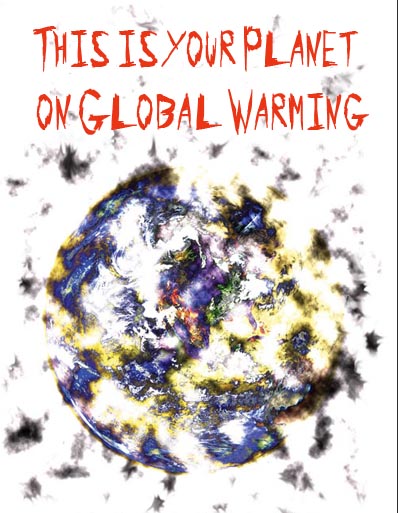
|
||
|
||
|
|
|
The Problem
Today, despite the thousands of difficult issues that people face throughout the world, global warming is the one problem that renders all others moot. Our compulsive poisoning of the atmosphere with carbon dioxide, methane and other heat-trapping gases is threatening to render the planet earth uninhabitable for human beings. Thousands of other species have met recent and rapid extinction at the hands of human exploitation; there is no reason to think that homo sapiens will necessarily be any different.  Five years ago scientists said that our children and grandchildren would have
to deal with climate change. Yet today we are in its throes. Then they said
it was nothing more than a possibility that the Gulf Stream would slow to a
halt. Now the current which creates a temperate climate for England, Northern
Europe and the Northeastern United States is diminished by twenty percent and
slipping. It is all happening far more rapidly than even the most alarmed
scientists had imagined.
Five years ago scientists said that our children and grandchildren would have
to deal with climate change. Yet today we are in its throes. Then they said
it was nothing more than a possibility that the Gulf Stream would slow to a
halt. Now the current which creates a temperate climate for England, Northern
Europe and the Northeastern United States is diminished by twenty percent and
slipping. It is all happening far more rapidly than even the most alarmed
scientists had imagined.
Positive feedback loops, where, for example, a warmer planet releases stored carbon dioxide and methane from the permafrost which in turn accelerates warming and releases ever more greenhouse gases, promise to accelerate climate change exponentially. From the acidification of the oceans to the melting of the glaciers to widespread droughts to unpredictably violent weather, we have set processes in motion which we barely understand, the consequences of which we can barely grasp. Changing American Culture A linchpin in arresting climate change is the public opinion and response in the United States. Force fed disinformation sponsored by the immensely wealthy fossil fuel industry and the politicians they have bought, we in the United States are both the most aggressive producers of greenhouse gases and far behind most of the rest of the world in understanding the implications of our blind consumption. Reaching the American public, educating and appropriately alarming those of us who are the most responsible for this catastrophe, are an exceedingly urgent priority. Surely we are not the only ones who must change, but without us no change will be sufficiently rapid or comprehensive.  An occasional news article, or even films like An Inconvenient Truth or
The Day After Tomorrow, are important but hardly adequate. Our media
still report oil and gas industry news as if it's just a question of where to
get more to burn - hardly ever mentioning that even though we've found new
fields we shouldn't burn what's in them. We have to change the culture
of consumption itself.
An occasional news article, or even films like An Inconvenient Truth or
The Day After Tomorrow, are important but hardly adequate. Our media
still report oil and gas industry news as if it's just a question of where to
get more to burn - hardly ever mentioning that even though we've found new
fields we shouldn't burn what's in them. We have to change the culture
of consumption itself.
Corporate America knows how to drive spikes into our awareness and twist them to do its bidding. It accomplishes control in part by repeated exposure to its messages, day in and day out, through all available means of communication: schools, television, radio, direct mail, planting "articles" in newspapers and magazines, internet techniques, establishing "chairs" in universities, making movies with famous stars and product placements, taking over local governments, funding religious activity, billboards, direct mail, t-shirts, textbooks - possibilities are endless. For us, these efforts on the national scale that would be necessary will be enormously expensive. Clearly we don't have those billion dollar budgets - yet. But what is the pricetag of having a livable planet for our children the world over to fulfill the joy and promise of being human? There is an oncoming train wreck, the Earth is in its path, and there is nowhere else to go. It is time to attempt a profound cultural change in America, from consumption to sustainability. We are not interested in promoting half-measures like recycling or energy-star lightbulbs, although such are undoubtedly useful elements of a major transition. The basic public opinion we are looking for is: "Global Warming is here now, it will render the earth unlivable, we are already seeing unmistakable signs of disaster, and we have to make fundamental changes now, immediately - in our town, region, country and world." As hurricane Katrina did for a relatively brief period, the problems of global warming must seize people's attention on a daily if not hourly basis, for many years to come. The public actions we are looking for are local with global implications, including creating a political earthquake towards democracy and self-determination, realigning economic activity, and changing expectations and lifestyle. Part of the education effort will be to present detailed and practical measures that individuals and communities can take to move towards significant and meaningful change. We can afford to do no less. What can we do? First, we start looking at ourselves and our "way of life" differently. If we assume, for example, that America is a democracy, then we employ the mechanisms available inside the box that we have been taught will make the democracy work. But we've been doing this for over 250 years, and it still doesn't work - we have a thousand answers to why it's not working, all based on the assumption that it's a system that's supposed to work. When we finally realize that it was never meant to be a democracy (the founders said this themselves, they were very clear), the whole context in which we're operating changes, including the way we organize, how we deal with public office and officials, what we expect from our schools, etc. etc. We switch from an activism based on assumptions to one based on a much closer approximation of reality. There is no disrespect intended for the extraordinary and wonderful efforts that dedicated activists have been engaged in over the years - but while the oligarchy has made some concessions, we have to acknowledge that overall things are worse and rapidly deteriorating. So we have to pose questions along the lines that Richard Grossman and the Program on Corporations, Law and Democracy (POCLAD) so pointedly asked over a decade ago: What don't we know about the way things work? What do we need to know to turn this ship around? Most urgently and particularly with respect to climate change, but addressing many other issues that benefit people as well: health care, environment, poverty, globalization - the list is extensive. Democracy School has begun to address the issues of root cause and history, and we at CDC see the need to expand those explorations by further figuring out why we think the way we do (a root cause research issue) and how to reach people on a much broader scale (a process research issue). To inquire about participating in the Public Outreach Project, send us an e-mail at info {a-t sign} constitution411 [d~o~t] org and tell us what you'd like to do. Thanks to Swelter Designs for permission to use earth images from its line of ClimateCards. Check out Swelter's website at www.swelterdesigns.com, which includes numerous excellent links related to global warming. |
|
"I see in the near future a crisis approaching that unnerves me and causes me to tremble for the safety of my country . . . corporations have been enthroned and an era of corruption in high places will follow, and the money power of the country will endeavor to prolong its reign by working upon the prejudices of the people until all wealth is aggregated in a few hands and the Republic is destroyed."
Abraham Lincoln, President of the United States, 1864 Click here for more quotes. |
|
Back to Home Page
| |
|
Center for Democracy and the Constitution 12 Locust Avenue Lexington, MA 02421 Call us at: (781) 674-2339 Or write to: info411 (at sign) constitution411 [d-o-t] org (no spaces) |
|
|
This site last updated on October 1, 2007 |
|
